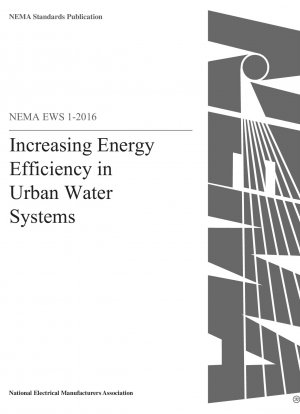NEMA EWS 1-2016
Increasing Energy Efficiency in Urban Water Systems Summary Report
- Standard No.
- NEMA EWS 1-2016
- Release Date
- 2016
- Published By
- NEMA - National Electrical Manufacturers Association
- Latest
- NEMA EWS 1-2016
- Scope
- Urban water systems throughout the country rely on energy-consuming technologies to develop@ transport@ treat@ and deliver billions of gallons of water to end users. Over the years@ the energy efficiency and performance of these technologies has improved significantly@ potentially reducing costs@ improving reliability@ and providing operational flexibility for system managers. Despite these potential benefits@ the water sector has been slow to adopt these new and innovative devices. In response@ the National Electrical Manufacturers Association (NEMA) selected GEI Consultants@ Inc. (GEI) and its partners (the Alliance for Water Efficiency and M.Cubed) to assess and identify new strategies and approaches to support the advancement of energy efficiency in urban water supply systems. The study team accomplished this by analyzing available information regarding the application of energyefficient technologies in water systems and the financing mechanisms used to fund these improvements. The team also engaged industry and water agency representatives through interviews and surveys to obtain more agency-specific information. Responses and available literature were analyzed to determine the extent of the current market penetration and the potential for further adoption. GEI??s team also evaluated the viability of energy savings performance contract (ESPC) practices@ government grants@ and other financing mechanisms to finance modernization and system upgrades. The literature review resulted in the compilation of a significant amount of information and data produced from numerous studies and projects over more than 20 years of efforts. The studies identified how systems operate@ where energy is used most@ and where opportunity exists to apply the best management strategies to improve the energy performance of these systems. The survey was distributed to more than 3@000 water agency representatives nationwide. These respondents represented a regionally diverse set of water agencies and provided meaningful insights into the level of interest in energy efficiency@ institutional and financial challenges to advancing efficiency in these water systems@ and possible steps that can be taken to overcome them. The study team determined that significant energy-efficiency savings potential exists within the urban water systems and that ESPCs are a viable business model to secure available funds to implement improvement projects. Results from this study will inform future collaborations between NEMA members and water utilities as well as the development of plans with measurable outcomes that advance the energy efficiency of urban water supply systems.
NEMA EWS 1-2016 history
- 2016 NEMA EWS 1-2016 Increasing Energy Efficiency in Urban Water Systems Summary Report
